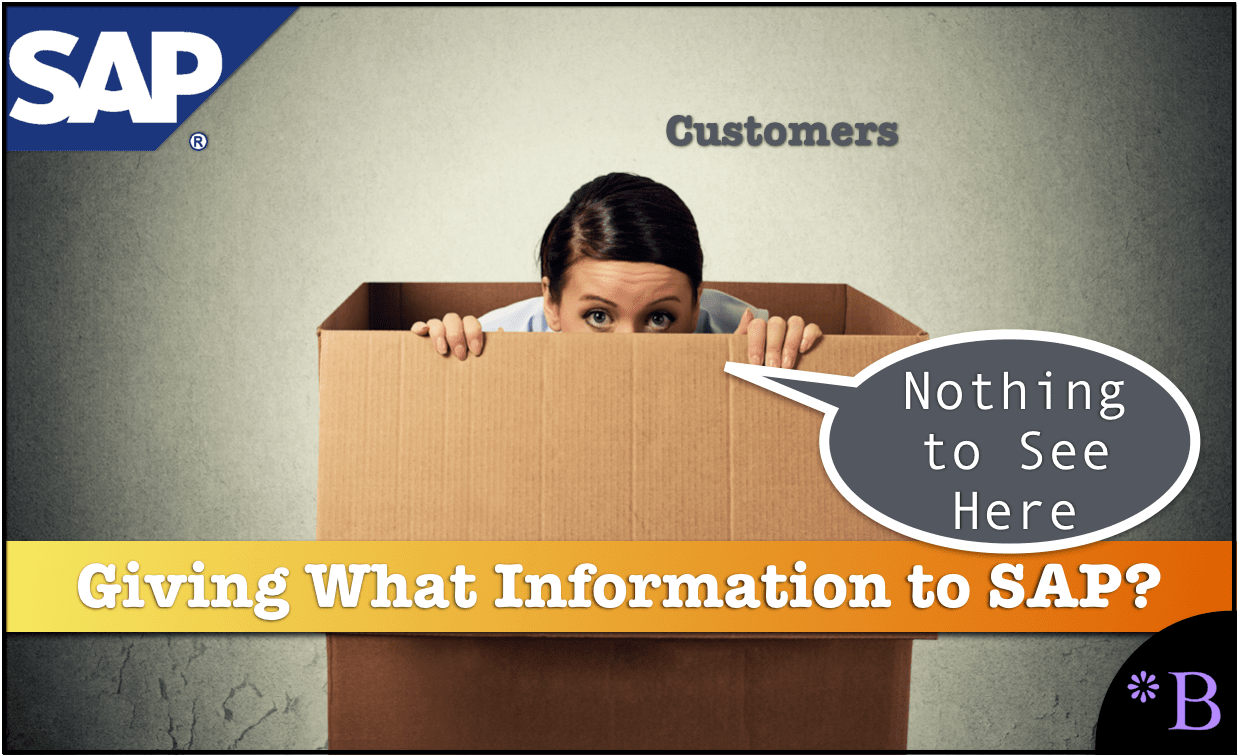How to Use Outsourced Support to Gain Privacy from SAP
Executive Summary
- Indirect access is triggered by specific behaviors on the part of the customer.
- Sharing information with SAP is a double-edged sword in that it opens the customer to more liability.

Video Introduction: How to Use Outsourced Support to Gain Privacy from SAP
Text Introduction (Skip if You Watched the Video)
Brightwork Research & Analysis has covered SAP’s indirect access extensively. It is one of our primary research areas. One of the things we have been researching lately is what tends to trigger indirect access claims. SAP support is a problem because it provides a continual flow of information about a company’s SAP software use to SAP. As SAP will provide very little support to customers (unless they buy costly support packages), SAP’s involvement post-go-live has little value but major liabilities. You will learn how to take support contracts away from SAP to buy a company more privacy from SAP’s prying eyes.
Our References for This Article
If you want to see our references for this article and other related Brightwork articles, see this link.
Notice of Lack of Financial Bias: We have no financial ties to SAP or any other entity mentioned in this article.
Sharing Information with SAP
And what we have come to learn is that SAP uses specific areas to trigger an indirect access audit. Gartner provided some coverage of indirect access. However, Gartner’s coverage of this topic is restricted because they probably receive around $100 million every year from SAP. Yet, there are still some exciting things to learn from Gartner.
In reviewing the Gartner recommendations on indirect access, I noted the following point:
“Proceed carefully. When audited by SAP (or any vendor), share the minimum amount of information required to comply with the audit terms in your contract, as SAP will use information provided regarding third-party interfaces to justify indirect access compliance fees.”
This got me thinking about the following tactics for reducing your risk of an indirect access claim.
- Use only internal or contract SAP resources to evaluate your indirect access exposure.
- Use a SAM vendor to evaluate your indirect access exposure.
But indirect access supports the idea that the less your SAP account executive knows about your use of SAP, the better.
This gets into the topic of support. The more that a company uses SAP support, the more SAP knows how its customers are using their software. However, SAP is the only software vendor that enforces Type 2 indirect access claims. And this is increasing on the part of SAP. SAP produced a misleading announcement on indirect access, covered in the article How to Best Understand SAP’s Faux Change on Indirect Access. SAP will continue to apply for indirect access because it is driving license revenue secondly. After all, SAP can steer customers to buy specific applications based upon an indirect access claim.
SAP’s Support Quality
SAP’s support quality has continued to decline over the past 15 years. SAP takes over 22% of what the customer paid for all of their licenses (there are several areas of support that are not covered in the standard 22%, which is why 22% is the minimum that a customer can pay. However, with most SAP support workers being based in countries like India, where the average pay is between $25 to $35 per day, the support margin is immense. This is covered in the article What to Do About SAP’s Declining Support.
There are two reasons to keep SAP’s support. One is for the actual support, which, as discussed, has declined to such a point that it is an inferior value. The second reason is to obtain the newest versions of the software. However, SAP is not coming out with very much further that is useful. SAP’s only good application was its ERP system, and most of the non-ERP applications have proven to be quite uncompetitive. This is covered in the article How SAP is Now Strip Mining Customers.
For this reason, there is little reason to continue to pay SAP’s support with its 90% margin when there are entities that can support SAP better than SAP at around 1/2 the cost.